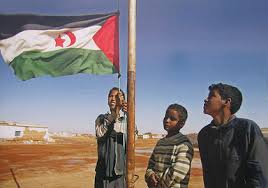|
|
A chronology of the Western Sahara conflict
|

|
A chronology of the Western Sahara conflict
1884: Spain colonizes the territory later to be known as the Western Sahara (named by the UN in 1975) between Tarfaya and Villa Cisneros (or Dhakla) according to the Berlin conference which divided up Africa among colonial powers.
1906: The Sahrawi population launches a war of resistance against Spanish rule.
1934: The Sahrawi resistance is defeated by France after twenty eight years of continuous war
1956: Morocco starts claiming territory
1960:The Sahrawi population becomes progressively sedentary and begins exploiting the rich phosphate deposits. At the same time the first political Sahrawi movement is formed which claims independence from Spain
1970: The new political movement is banned. The repression gives a strong motivating force towards Sahrawi nationalism.
1973: POLISARIO (the Saharawi liberation movement) is formed to speed up the slow process of decolonization by waging a guerrilla war against the Spanish. King Hassan II of Morocco starts officially claiming the territory to the North and Mauritania continues claiming territory to the south.
1974: A census of the Western Saharan population is undertaken by Spain (to see who is eligible to vote) in preparation for a referendum to be organized by the United Nations. December: The UN General Assembly asks the International Court of Justice to look into the dispute.
1975: The UN officially names the territory in dispute as the Western Sahara. October 16: The International Court of Justice announces that neither Morocco nor Mauritania should have sovereignty over the Western Sahara. The Saharawi population expresses its desire for independence and that POLISARIO should be the main political party.
October 16: Morocco starts a "Green March" of 350,000 Moroccans into the Western Sahara.
October 31: Moroccan forces enter the north west of the territory.
1976:
November 6: The Green March crosses the border. Spain signs the Madrid Accords handing the region over to Mauritania and Morocco, with Morocco securing the richer two-thirds.
February 27: POLISARIO forms the Sahrawi Arab Democratic Republic and forms a government in exile.
1979: Mauritania abandons its territorial claims in the south and recognizes the rights of the Sahrawi people by signing a peace agreement.
1980: Morocco begins construction of a huge sand wall, 1500 km long and 3 metres thick, known as the "Great Wall of the Sahara," to keep POLISARIO forces out of occupied Western Sahara.
1984: SADR becomes a full member of the Organization of African Unity
1990: A settlement plan, to be administrated by the UN peace-keeping force MINURSO, is set up by the UN. MINURSO is mandated to organise a poll asking the population of the Western Sahara whether they would prefer to be integrated into Morocco officially or to be independent. MINURSO must compile a list of eligible voters who can vote in the referendum.
1991: Cease fire between Polisario and Morocco takes effect. One month before the beginning of the settlement plan implementation, Morocco begins a series of violations against the cease fire. Morocco also denies MINURSO free movement through occupied Western Sahara and submits an application on behalf of 120,000 of its citizens to take part in the poll (thus trying to rig the outcome). Morocco also moves thousands of new settlers into the region.
1992: The first scheduled referendum is postponed at Morocco's insistence.
1997: A series of talks, spearheaded by the UN's special representative, James Baker(former US Secretary of State), result in the Houston Agreements, a new framework for the implementation of the peace plan and the holding of the referendum.
1998:A referendum scheduled for December is postponed at Morocco's insistence.
1999: In the face of ongoing Moroccan instransigence, UN Secretary General Kofi Annan puts forth a new package of proposals to culminate in a referendum in December 1999. Polisario accepts the entire package. Morocco has accepted in principle but continues to reject certain provisions of the package.
| |
|
|
|
|
|
|
|